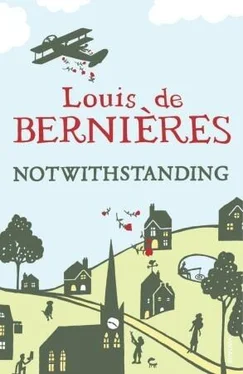Louis de Bernieres - Notwithstanding - Stories from an English Village
Здесь есть возможность читать онлайн «Louis de Bernieres - Notwithstanding - Stories from an English Village» весь текст электронной книги совершенно бесплатно (целиком полную версию без сокращений). В некоторых случаях можно слушать аудио, скачать через торрент в формате fb2 и присутствует краткое содержание. Год выпуска: 2010, Издательство: Vintage, Жанр: Современная проза, на английском языке. Описание произведения, (предисловие) а так же отзывы посетителей доступны на портале библиотеки ЛибКат.
- Название:Notwithstanding: Stories from an English Village
- Автор:
- Издательство:Vintage
- Жанр:
- Год:2010
- ISBN:нет данных
- Рейтинг книги:4 / 5. Голосов: 1
-
Избранное:Добавить в избранное
- Отзывы:
-
Ваша оценка:
- 80
- 1
- 2
- 3
- 4
- 5
Notwithstanding: Stories from an English Village: краткое содержание, описание и аннотация
Предлагаем к чтению аннотацию, описание, краткое содержание или предисловие (зависит от того, что написал сам автор книги «Notwithstanding: Stories from an English Village»). Если вы не нашли необходимую информацию о книге — напишите в комментариях, мы постараемся отыскать её.
is a funny and moving depiction of a charming vanished England.
Notwithstanding: Stories from an English Village — читать онлайн бесплатно полную книгу (весь текст) целиком
Ниже представлен текст книги, разбитый по страницам. Система сохранения места последней прочитанной страницы, позволяет с удобством читать онлайн бесплатно книгу «Notwithstanding: Stories from an English Village», без необходимости каждый раз заново искать на чём Вы остановились. Поставьте закладку, и сможете в любой момент перейти на страницу, на которой закончили чтение.
Интервал:
Закладка:
Eventually they find the green-and-grey Rover, and the policeman strokes the wing appreciatively. ‘Lovely cars, these,’ he says. ‘I learned to drive in one. Built like a tank, never go wrong. Bit heavy on the old petrol, though.’ He notices that the keys have been left in the ignition.
Bella wakes up and greets her master with all the joy that old age and stiffness might allow. She eyes the policeman suspiciously, but allows him to fondle her ears.
The General loves it in his new home. Bellevue is simply vast, the biggest house he has ever had. It is even bigger than his childhood home in Gloucestershire, the great house that was demolished because of inheritance tax. He has an enormous staff of servants who are more conscientious than all the wallahs, orderlies and batmen he has ever known put together. He wonders why the regiment never thought of having women help out in the mess, but of course in his day it simply wasn’t done.
Best and happiest, his wife has unaccountably returned, radiant with all the adorable golden prettiness that first besotted him, in the form of a twenty-two-year-old nurse who has become very fond of him and pays him special attention. She makes sure that he remembers his trousers and his tie, and speaks to him in the soft and musical voice that he has so acutely but unwittingly missed these last few months. He tells her frequently that he has washed all her jerseys, ready for when she comes back, and she strokes his cheek, thanks him and plants a chaste kiss on his forehead. He is as much in love with her as he ever was, and calls her ‘my darling’ as he reaches out to take her hand.
In the daytime the General sits on a bench by the front door, with his walking stick at the ready and with Bella at his feet. She is brought in every day by the old lady who now cares for her, and is fed leftovers by the staff. The General walks her slowly round the grounds, which are full of magnificent rhododendrons, and gives advice and instruction to the two tolerant gardeners.
Whenever anyone comes through the door, the General, when he is at his post, rises courteously to his feet and greets them. ‘Do come in! Delighted to see you. Let me call someone to take your coat. What can I get you? Scotch? Don’t touch the stuff myself. Sherry? Medium or dry?’
The visitors and staff get used to the distinguished, sweet old man, they humour him affectionately and politely, and some of them listen with diminishingly reluctant interest as he regales them with highlights from his adventurous past. They can hardly believe that once upon a time in the Khyber Pass this ancient man, mounted on a bay horse, charged into battle with a sabre, and they will miss him for weeks when one day Bella is not at her place by his feet, and he is neither in the garden, nor at his bench by the door.
RABBIT

JOAN WALKS WITH the Major, and with Leafy, wife of the redoubtable Colonel Pericles Barkwell. It is an evening late in March, but the day has seemed more like one from the end of June. They have gone out warmly dressed, because it is only March, after all, and now they are huffing and sweltering as they circle the bounds of the fields behind Joan’s home. Joan doesn’t like to sweat so much because she doesn’t want people to know that she has been struck by the menopause, and it is beside the point that this particular sweat is brought about by a very English refusal to concede that any March day might be other than cold and blustery.
The Major is clad in green wellingtons, corduroys, a grey woolly jumper and a khaki-coloured quilted body warmer that enhances his military mien. In his pocket is a supersonic whistle for the dog, which he never uses because he has trained the dog to respond to parade-ground orders. ‘Dogs will retire. Ab-o-u-t turn!’ he roars, and the black Labrador obediently comes to heel. The supersonic whistle is a present from his son in the City, who believes in high-tech solutions to problems which no one had previously recognised as problematical.
Leafy Barkwell is dressed in wellies, and a tweed skirt that has seen smarter days. Its wool has been teased by bramble and thorn for a decade, and some people have taken to commenting unkindly that it looks like a sisal doormat. It is the only scruffy garment she has, because indoors she is elegant, and indoors is where she most likes to be. Today, however, she has succumbed to the warmth of the day and has come out at the same time as the primroses, with which she shares some of her delicate beauty, even though she is no longer young.
In the clump of elms at the end of the field noisy squadrons of rooks croak and squabble. It is nesting time, and the birds are raiding all the surrounding trees for twigs, which they bring back to the elms, where other birds try to snatch them away. There are quarrels and tugs of war, and the booty almost inevitably gets dropped, whereupon the birds fly off back to the willows and oaks in order to break off more twigs with elaborate exertion that involves much acrobatic risk. The fallen twigs they stupidly do not bother to collect, so that under the rookery the ground begins to look as though a small hurricane has just passed by. In the old days when the peasants had been poor, when, in fact, there actually had been peasants, they used to come and collect the fallen twigs, and bind them into faggots. Now there is only one peasant left, malodorous old Obadiah Oak, with his teeth like tombstones. Jack Oak is probably the only person left who can remember what it was like to collect rook faggots and to know that young rooks aren’t scared of guns. The adults flew away, but you just took your rook gun and shot the youngsters off the branches where they sidled about in confusion. Then you cut out their breasts and made rook pie.
Leafy begins to compose verses in her head that one day she might send to The Lady , or Country Life magazine. She writes mainly about the beauties of nature, which normally she experiences from the other side of her drawing-room window. Her poetry is very like the stuff that used to be anthologised in the 1920s by people like J. C. Squire, and she represents an England that urban intellectuals and university lecturers assert to be dead, merely because they wish that it were so, and do not realise that it is not. Millions of country people are quite unaware that this version of pastoral England is supposed to have gone, and so they continue to live in it with perfect calm and acceptance. Leafy writes poetry that rhymes inexactly, and struggles to scan, about blackbirds singing on fence posts, and woodlarks up in the blue, and about clouds, and about hearts beating in unison. She is as unaware of being quaint as she is of the gnomic poetry of T. S. Eliot or the angry verse of Adrian Mitchell.
On the village green the man with the ridiculous dog called Archie is throwing golf balls in the hope of training it to retrieve them. On the other side of the copse the crack of Polly Wantage’s twelve-bore announces that she is once more persecuting squirrels. Up the hill Miss Agatha Feakes sounds the horn of her vintage Swift as she careers past the convent with a goat on the back seat as usual. On the common the Rector, armed with a plastic sack and a yellow plastic beach spade, is patrolling the bridleways and collecting horse droppings for his roses. In the graveyard of St Peter’s Church, Mrs Mac converses with the ghost of her husband. She asks him if he remembers the time when they were little children and all thirty-two of the pupils in the village school managed to pile into the hollow centre of the gigantic yew. In her house on the green, Mrs Griffiths opens a gin bottle and pours herself a tiny tipple which she dilutes with Ribena. She has thought of a new plot for her latest bodice-ripper, in which a beautiful young orphan called Venetia discovers that she is really an heiress, and has to choose between a handsome lord who probably wants her for her money, and the boy who was her teenage sweetheart, but has no prospects. In the middle of the field, a small posse of Friesian cows stands motionless beneath the huge oak that has been there since the English revolution. In the wood the bluebells are up, but have not yet blossomed, and the snowdrops and winter aconites have flowered awhile and gone.
Читать дальшеИнтервал:
Закладка:
Похожие книги на «Notwithstanding: Stories from an English Village»
Представляем Вашему вниманию похожие книги на «Notwithstanding: Stories from an English Village» списком для выбора. Мы отобрали схожую по названию и смыслу литературу в надежде предоставить читателям больше вариантов отыскать новые, интересные, ещё непрочитанные произведения.
Обсуждение, отзывы о книге «Notwithstanding: Stories from an English Village» и просто собственные мнения читателей. Оставьте ваши комментарии, напишите, что Вы думаете о произведении, его смысле или главных героях. Укажите что конкретно понравилось, а что нет, и почему Вы так считаете.












